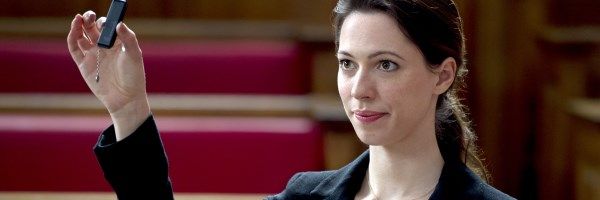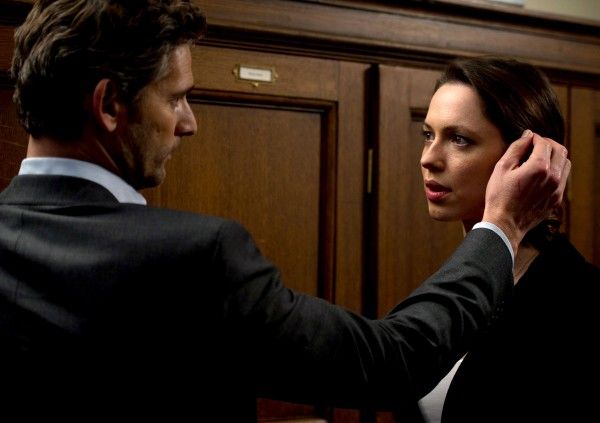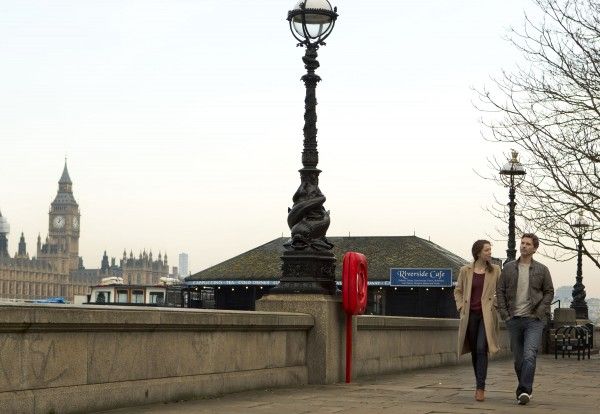The international suspense thriller Closed Circuit tells the story of two ex-lovers, Martin Rose (Eric Bana) and Claudia Simmons-Howe (Rebecca Hall), who are bound together on the defense team for a high-profile terrorism case that turns out to be such a far-reaching conspiracy that it places both of their lives in jeopardy. From director John Crowley, the film also stars Ciarán Hinds, Jim Broadbent, Riz Ahmed, Anne-Marie Duff and Julia Stiles.
During this recent exclusive phone interview with Collider, actress Rebecca Hall talked about why she found this story so gripping and intriguing, making sure the complicated issues in the film were easy for audiences to digest, how much fun she had working with Eric Bana, what made their characters’ romantic relationship so interesting, how exciting it was to get to work in and around London in real locations, and how she feels about the concept of being spied on. She also talked about what attracted her to Transcendence, and what it was like to work with acclaimed cinematographer Wally Pfister on his directorial debut. Check out what she had to say after the jump.
Collider: How did you come to this project?
REBECCA HALL: I got sent the script, and then I had a meeting with John Crowley. I think I knew pretty much 30 pages into it that it was something that I wanted to do because it’s a gripping story, the characters are intelligent and fascinating, it’s a world that I didn’t know much about and found intriguing, and it’s also so relevant.
This story seems like it could have easily become confusing and convoluted, but it’s pretty understandable and easy to follow. Was that important to you?
HALL: Absolutely! There’s no point in doing it, if what you’re talking about isn’t clear. Also, it would be irresponsible because we’re talking about things that really go on. Closed court proceedings happen in England. We’re a country that prides itself on justice and the rule of law, so the notion that there are court cases where the defendant has no notion of the evidence that’s being brought against them, and you can’t have a fair trial, in the sense that you can’t stand up and say, “I didn’t do that,” or “I wasn’t there,” and you don’t even know what the evidence is against you, is something that needs to be illustrated clearly in the film so that it can be a topic for discussion. It should be a topic for discussion because it’s going on. So, I thought it was paramount, really, that that was clear. It’s recent. It’s not something that’s entrenched in the legal system. This all comes out of cases that pertain to national security, and there are reasons that it has to go on that are understandable, but right now, it’s trying to be extended into civil cases, which is very complicated. The idea that it will be such a standard procedure in British law is a very controversial one.
How was it to work with Eric Bana on this, and really have someone like him to go on this crazy thrill ride with?
HALL: It was great! One of the things that nobody really expects about him is that he’s strikingly funny and has a great sense of humor. He often plays very serious characters, but he started as a stand-up comic, so he’s incredibly quick-witted. That was refreshing to find out, and great fun to be around.
What do you think it was that really drew Martin and Claudia together, initially? And do you think she was secretly happy that he had to confront his feelings for her again?
HALL: We talked a lot about this. I thought there was something intrinsically fascinating about people who communicate for a living and are incapable of communicating in their personal lives. I don’t want to make vast generalizations about people who go into legal professions, but there are similarities in the barristers that I met and interacted with, in the sense that they tend to be highly eloquent, highly analytical, thinking people who have a very rapid-fire think-before-they-speak button, as it were. All of their emotions get processed and then placed into the form of argument before they express it. So, if you apply that way of being to romantic issues, you get a very interesting tension between people who are capable of hiding their emotions and reducing their emotions to argument, and yet are very emotional, at the same time. It’s contradictory and a fascinating dynamic. It’s quite sexy, as well. I thought that was a fun thing between these characters. They’re able to verbally outwit and spar each other. That’s their bread and butter, as it were.
This movie has a great balance between the legal stuff and the romance, that keeps it from getting cold and emotionless.
HALL: Well, it can get quite dry. I don’t think that anyone can really understand anything until it’s understood on a cellular, emotional level. It’s one thing to think about something, but it’s another thing to actually feel it. I think what’s very clever about this film is that it presents what could essentially be quite dry topics, which are, nonetheless, very important to our society, and presents them and captures them in an emotional context. It makes it that much more comprehensive.
What was it like to get to work in and around London and be in some real locations? Did that just add so much more to what you were doing?
HALL: Yeah. I don’t think anyone’s ever made a great conspiracy thriller in London. I think it’s a great setting for it, so that was really exciting. And the locations were locations that I know and love. We even shot in some of my favorite restaurants in East London. That was really exciting to me. It’s so rare that I get to do something in my own accent, in my own hometown.
There’s been a lot said about how John Crowley is really able to get subtle and truthful performances from his actors. How did you find him, as a director?
HALL: He is fastidious. He pays serious attention to the details. He also has the experience of a theatre director, and theatre directors have a tendency to really work the text. Instead of throwing the text out and asking for a rewrite, theatre directors will work at it with the actors and try to find a solution, which is often the way you find original and creative moments, rather than reducing things to stuff that’s pat and easy to get. I also think he’s got a really good eye for suspense. He knows how to wield the camera in a way that will watch what you want to be looking at. I think he’s a really, really clever filmmaker, and he’s very good with actors. He’s the win-win combination.
This film really explores a number of ideas, with how much we’re watched and how information is controlled. Had you thought about any of these ideas before doing the film, and since doing the film, are those things you think about now?
HALL: I think we all think about it. A good piece of art raises questions, and this film definitely does. I’ve always thought about the civil liberties and privacy issues, and all those things that the film deals with. I suppose I think about them a little bit more now, but I think we all do, in light of recent things in the newspapers, like Snowden and all the rest of it. And I think what’s more troubling, perhaps, than the notion that we’re all being spied on, which has probably always been going on, is how acceptable it’s becoming. I don’t think it’s enough to say, “I’ve got nothing to hide, therefore it’s fine for everyone to look.” We need to be asking those questions.
What attracted you to Transcendence? Was it the story and character, was it the fantastic cast, or was it the opportunity to work with Wally Pfister on his directorial debut?
HALL: Well, it was all of it, really. It’s a really great story, and a very unusual story. It was a great character, as well. It was all of the above, that you said. And I love Wally from when I met him on The Prestige. It was such an honor, really, to be asked to be a part of his first directorial moment.
What’s he like, as a director? Did it seem completely natural for him?
HALL: It was a great combination of all of the enthusiasm and perfectionism and energy of a first-time filmmaker, and a thousand times the experience. It was completely unique. I will never again work with a more experienced first-time film director. He knows everything there is to know about being on a film set, and he knows how to direct a movie. That was not ever in question. So, it was really interesting.
Closed Circuit opens in theaters on August 28th.



